I pruned petunias today,
dead-headed shriveled blossoms
past their prime.
It wasn’t hard to take dry ones, to pinch,
nip off those bent for seed,
but removing ones not quite dead, spotted,
or discolored, still harboring life’s spark
brought me up short, jolted me
like a seedling torn from its bed.
I saw old Jessie propped up on pillows,
still smiling through her oxygen mask,
listened for the faint beep
of my mother’s heart monitor
and felt my husband’s frail hand
as he spoke unanswered prayers.
I could not pluck the faded petals
hanging tenaciously to vine,
those reaching for the sun’s best rays.
Though those spent bodies,
squandering energy needed for new growth,
crowded round dazzling beauties
I could not hasten their leaving.
I could not bear to let them go.



